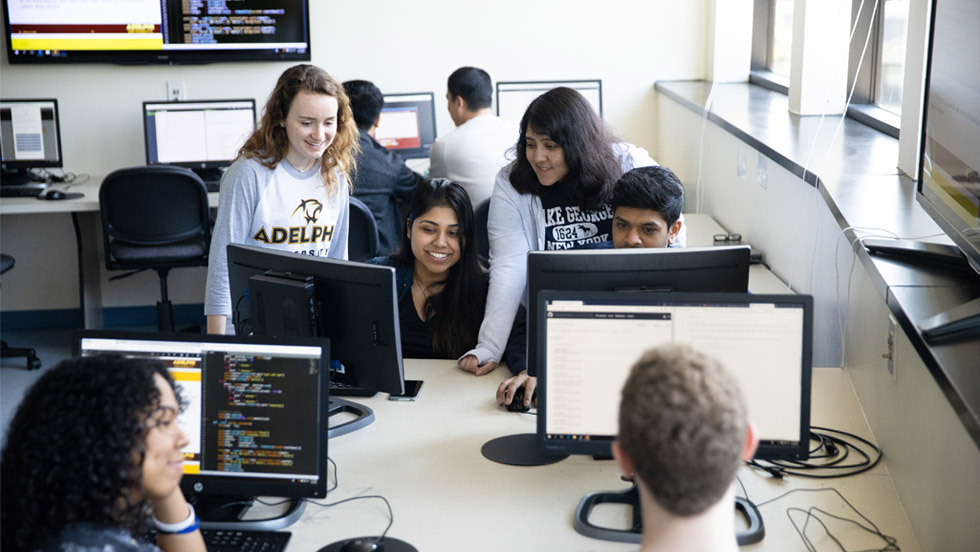
Adelphi is one of the few area universities to offer both undergraduate and advanced degrees in artificial intelligence, a reflection of its commitment to preparing students for today’s—and tomorrow’s—careers.
Adelphi is educating the first generation of AI professionals with two new programs launching this fall—a BS in Artificial Intelligence and an MS in Artificial Intelligence and Machine Learning—making Adelphi one of the few universities in this area offering both.
While Adelphi’s Department of Mathematics and Computer Science has run classes in AI and machine learning for more than a decade, these new, dedicated programs are designed to help students build forward-thinking careers in today’s fastest-growing fields.
“The world around us is in need of people who understand artificial intelligence,” said Kees Leune, PhD, associate professor and chair of the department. “In our department, we are almost ideally positioned [to offer these programs] because our core expertise is mathematics, statistics and computer science. Artificial intelligence works on the intersection of exactly those three fields.”
Learn more about what Adelphi’s new AI programs entail and how they will equip students with the knowledge and skills to build cutting-edge careers.
Building foundational knowledge of AI

Kees Leune, PhD, associate professor and chair of the Department of Mathematics and Computer Science
In the undergraduate program, students will focus on building AI algorithms and software to solve problems using mathematics. The students aren’t just learning how to use popular tools like ChatGPT—they’re developing a foundational knowledge of how AI algorithms work through hands-on experience.
“If I teach you all about how to use a particular tool now, and you graduate three years from now, there’s a good chance that tool is already outdated,” Dr. Leune said. “What we try to give you is the concept that you can learn to understand the next version of that tool directly.”
The new master’s degree program takes these concepts even further by exploring real-world applications of AI and machine learning in areas like software engineering, data analytics and mathematical modeling.
“Over the past few years, we’ve seen more and more of our undergraduates going on to pursue master’s in computer science, machine learning and related disciplines,” said Associate Professor Anil Venkatesh, PhD. “We launched this master’s program to retain some of our best undergraduates while also offering an attractive program to students coming from elsewhere.”
Preparing students for groundbreaking careers

Anil Venkatesh, PhD, associate professor, Department of Mathematics and Computer Science
So, what careers can AI majors expect to pursue? The answer spans a range of job functions across the tech world—including roles like software engineer, AI systems architect and data scientist.
“Specifically, [undergraduates] will be prepared for a career as an AI engineer: someone who designs and builds AI algorithms or someone who designs and builds software using AI algorithms,” Dr. Leune said. “You will be graduating as a very capable computer scientist who has added knowledge in mathematics and statistics.”
The master’s degree program also places a great deal of emphasis on real-world engineering applications to prepare graduates for their careers. In his statistical consulting course, for example, Dr. Venkatesh and his students analyze data sets from real businesses, including a major e-commerce company, a video game studio and a tech start-up.
“I designed the courses this way because I know that companies are increasingly interested in hiring candidates who not only understand the theory behind machine learning but can also deploy that theory at scale to solve pressing business problems,” Dr. Venkatesh said.
Adelphi will also offer a 4+1 curriculum—combining both the bachelor’s and master’s degree programs—to help students fast-track their careers while saving a year of tuition.
“We put a lot of emphasis on cultivating professional relationships with our students and helping them get the most out of their experience at Adelphi,” Dr. Venkatesh said. “With many competitive career paths now expecting a master’s credential, our 4+1 curriculum will help our students get the preparation they need and enter the workforce as efficiently as possible.”
Programs designed to evolve as AI matures
AI tools don’t look like they did a year ago—or even a few months ago. That’s why, along with providing foundational tools in AI and machine learning, Adelphi’s programs also include courses that are specifically designed to evolve over time.
“It seems like every month brings a new use case for AI in industry,” Dr. Venkatesh said. “We designed the master’s program to be responsive to this trend, so there is a lot of customization possible for each student to get the training they need from us.”
In the AI seminar, for example, students begin by reviewing the latest technologies—which may very well be unique for each class—and discussing how to apply them at a high level.
Continuing to adapt each program to new AI developments is no small task, but it’s one Dr. Venkatesh looks forward to taking on.
“It’s going to be really exciting to work with a bunch of motivated students who are trying to break into this competitive new industry,” he said. “It’s also going to be a fun challenge to stay up-to-date with all the new discoveries and pass that knowledge along to our students.”